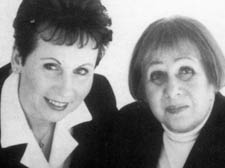|
|
 |
| |

Edith Hahn Beer with her daughter, Angela Schlüter, in 1998 |
The Jew who married a Nazi
Dan Carrier on the death of a remarkable woman who survived Hitler’s Germany and went on to get the better of the Stasi, too
The Nazi Officer’s Wife: How One Woman Survived the Holocaust
By Edith Hahn with Susan Dworkin, is published by Abacus.
EDITH Beer was wanted by the terror departments of the 20th century’s most vicious dictators – yet outfoxed them both.
Mrs Beer, who has died aged 95, not only hoodwinked the Gestapo but also gave the Stasi the slip while they spent six months using heavy tactics to enlist her as a spy.
She spent the war years living in the heart of Germany under false papers and pretending not to be Jewish. She then escaped the clutches of the East German secret police after the war to find a new life in London.
Edith’s story was hidden for 50 years; she did not like to speak about her experiences. But Holocaust historians eventually persuaded her to write a book* about her extraordinary survival – and it explains how her daughter Angela, an artist who lives in West Hampstead, came to be born by a Jewish woman in an exclusive Nazi hospital at the height of the Holocaust.
“My mother was born in Vienna in 1914,” states Angela. “Her father Leopold owned a restaurant and they were comfortably off. Although Edith was expected to follow in to her mother’s trade – she was a master dressmaker – Edith was an outstanding student and went on to study law.”
After the Anschluss, when Germany took over Austria, the Hahn family were split up. Leopold had passed away, Edith’s sister Hansi had bought a visa to emigrate to Palestine, while Edith’s mother Klothide was deported east, to die in the Holocaust.
“Edith was to be deported east,” says Angela, “but was taken to Germany where she was made to work on a farm for six months.”
Here she met a fellow Austrian Jew. “She told Edith of an address in Vienna where a sympathetic woman lived and would give her help.”
After the harvest Edith was sent back to Vienna and told to register with the Gestapo: by doing so, she realised she would be signing her own death warrant. She took the decision to live on the streets.
“My mother decided to visit the address she had been given and from there she was put in touch with another Austrian who would help. She was told to go to his home immediately,” says Angela. “When she got there, the door was answered by a man in SS regalia. You can imagine her shock – but this was a visit that would save her life.”
The officer was a prominent Nazi, and although Edith never found out why, he told her how she could become a “non-Jew” until sanity returned to Europe.
“She was told that she should find a friend who was a non-Jew,” explains Angela. “The friend would go to the authorities and say they had accidentally dropped their handbag in the Danube with their identity cards and baptism certificates. New ones would be issued – giving Edith a set of genuine identity papers.”
The officer added if she then left Vienna she could use her identity to register in another town and would get a ration card.
“His advice worked,” said Angela. “Edith moved to Munich and forged a new life as a Jew at the heart of the Reich.”
And it was here she met a German officer called Werner Vetter. He was working in an aircraft factory and began to court Edith. She was wary – as she was terrified of discovery. But she realised her reclusive life could also bring unwanted curiosity, and so she began to see the handsome Nazi officer.
Edith got a job as a Red Cross nurse – one of the only posts you could hold without registering at a state work agency. But then she fell pregnant. “She agreed to marry her boyfriend,” says Angela. “But decided she had to tell him her secret. Thankfully, he told her he too had not been totally honest. He admitted he had a five-year-old daughter and a wife he was in the throes of divorcing. He promised her true background would never be revealed.”
It meant Angela was born in an exclusive hospital for Nazis in 1944.
Werner was eventually captured by Russian troops and sent to Siberia. He survived.
After the war, Edith worked in Brandenberg courts as a judge. But in 1947 a KGB agent tried to recruit her, telling her it was her chance to get her own back on the German people. She declined and found herself in danger.
For six months they tried to make her change her mind – forcing her to flee to London.
Edith passed away in Golders Green last week. Her survival to such an age was against incredible odds.
But her bravery in cheating the Nazis and the Soviet Union has ensured her amazing story will not be forgotten. |
 |
|
 |
 |
|
 |
|


